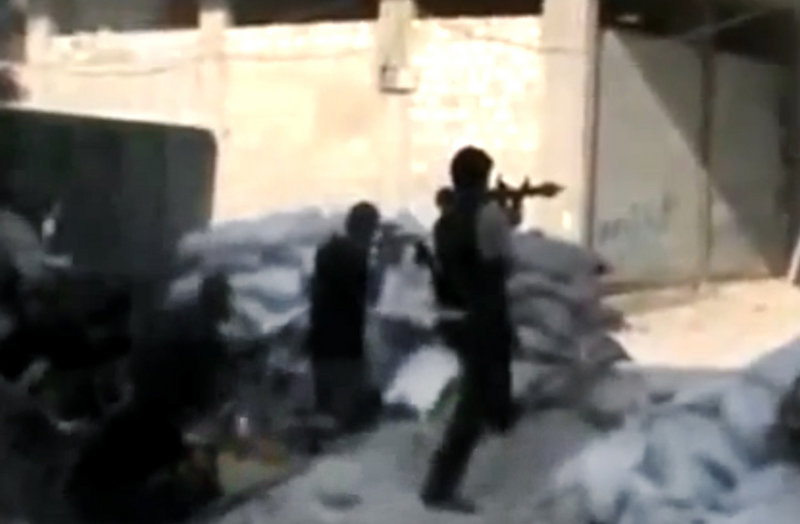BEIRUT – Syrian rebels fired grenades at tanks and troops while regime armor shelled Damascus neighborhoods on Monday, sending terrified families fleeing the most sustained and widespread fighting in the capital since the start of the uprising 16 months ago.
A ring of fierce clashes nearly encircled the heavily guarded capital as rebels seeking to overthrow President Bashar Assad pushed the civil war that has been building in Syria’s impoverished provinces closer to the seat of power.
For many of the city’s 4 million people, the violence focused in a string of southwest neighborhoods was an introduction to the kind of strife that has deeply scarred other Syrian cities.
In high-end downtown cafes frequented by the business and government elite tightly bound to the Assad regime, customers watched as black smoke billowed on the horizon and the boom of government shells reverberated in the distance.
“Without a doubt, this is all anyone is talking about today,” a Damascus activist who gave his name as Noor Bitar said via Skype. “The sounds of war are clear throughout the city. They are bouncing off the buildings.”
Syria’s violence has grown increasingly bloody and chaotic in recent months as the uprising has morphed from a peaceful protest movement seeking political change into an armed insurgency seeking to topple the regime by force.
Anti-regime activists say more than 17,000 people have been killed, and the government says it has lost more than 4,000 security officers. It does not provide numbers of civilian dead.
International diplomacy has failed to stop the violence, and world powers remain deeply divided over who is responsible and how to stop it. The U.S. and many Western nations have called on Assad to step downs, while Russia, China and Iran have stood by the regime.
On Monday, Russian Foreign Minister Sergey Lavrov accused the West of using blackmail to secure a U.N. Security Council resolution that could allow the use of force in Syria.
He objected to the text of a Western-backed resolution that calls for sanctions and invokes Chapter 7 of the U.N. Charter, which can be enforceable militarily.
Lavrov said Russia had been told that if it opposed the resolution, Western nations would not extend the mandate of a U.N. mission sent to Syria to monitor a cease-fire.
“We consider it to be an absolutely counterproductive and dangerous approach,” he said.
International envoy Kofi Annan, who has made little progress in brokering a political solution in Syria, met Russian leaders in Moscow on Monday.
The meeting — the latest in Annan’s efforts to save his faltering peace plan — comes a day after the conflict crossed an important symbolic threshold, with the international Red Cross formally declaring it a civil war, a status with implications for potential war crimes prosecutions.
Monday’s fighting suggested that deep cracks were appearing in the tightly controlled facade of calm that has insulated Damascus from violence throughout the uprising.
Send questions/comments to the editors.



Success. Please wait for the page to reload. If the page does not reload within 5 seconds, please refresh the page.
Enter your email and password to access comments.
Hi, to comment on stories you must . This profile is in addition to your subscription and website login.
Already have a commenting profile? .
Invalid username/password.
Please check your email to confirm and complete your registration.
Only subscribers are eligible to post comments. Please subscribe or login first for digital access. Here’s why.
Use the form below to reset your password. When you've submitted your account email, we will send an email with a reset code.